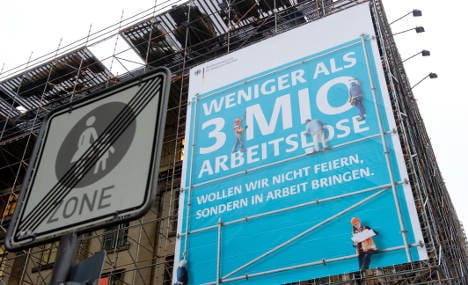“The economic upswing in Germany has continued, even though the tempo weakened in the third quarter,” the labour office said. “The recovery in the labour market tracks this.”
The total number of people out of work dropped 14,000 to 2.9 million, with the jobless rate unchanged at 7.0 percent, continuing the recovery of recent months as Germany bounces back from its worst postwar slowdown.
Adjusted for seasonal effects, the number of people out of work fell by 9,000 from October.
Economists surveyed by Dow Jones Newswires had forecast a bigger drop of 20,000, and in recent months the drop has been sharper, falling by 40,000 in August and by 17,000 in September.
In 2009, German output contracted almost five percent; yet Europe’s biggest economy has enjoyed a strong recovery this year thanks to strong demand for its exports.
In October, unemployment fell below the three-million level for the first time since late 2008 when the global financial system came close to collapse, sending the world economy into a tailspin.
Throughout the downturn, the government kept a lid on unemployment with a scheme helping firms to cut workers’ hours without laying people off.
But the recovery slowed somewhat in the third quarter, with gross domestic product (GDP) expanding by 0.7 percent after a jump of 2.3 percent in the second quarter of the year, the best performance for 20 years.
Chancellor Angela Merkel’s government expects growth of 3.4 percent this year, dipping to 1.8 percent in 2011.
Andreas Rees, economist at UniCredit, put a positive spin on the unemployment numbers, forecasting a rise in consumer spending, a weak point in the German economy.
“First, from a fundamental viewpoint, overall purchasing power is increasing. Second, from a psychological perspective, the feel-good factor is rising,” he said.
“We expect private consumer spending to rise by two percent next year. It would be the strongest increase within the last 10 years.”
AFP/rm



 Please whitelist us to continue reading.
Please whitelist us to continue reading.
Member comments